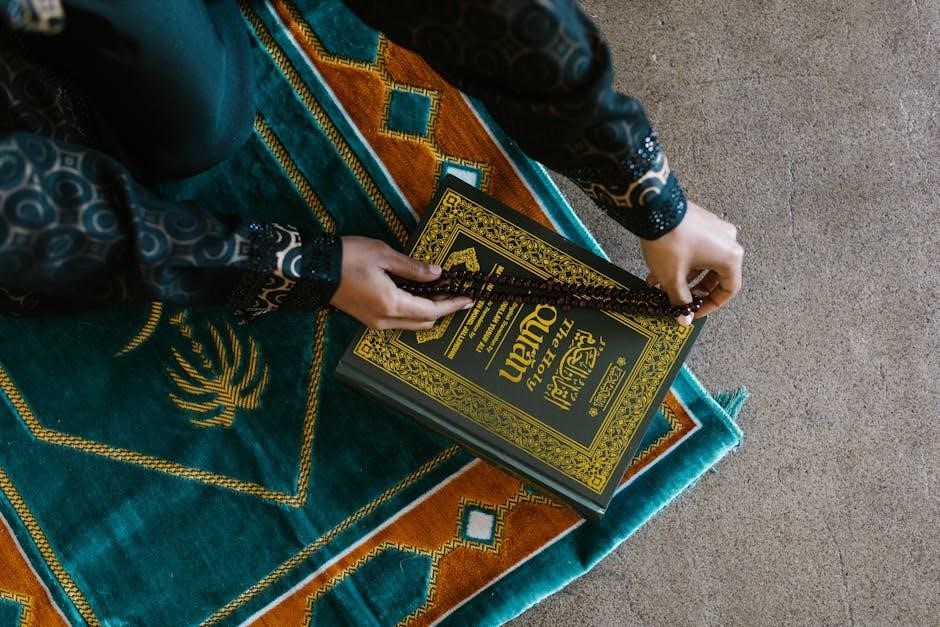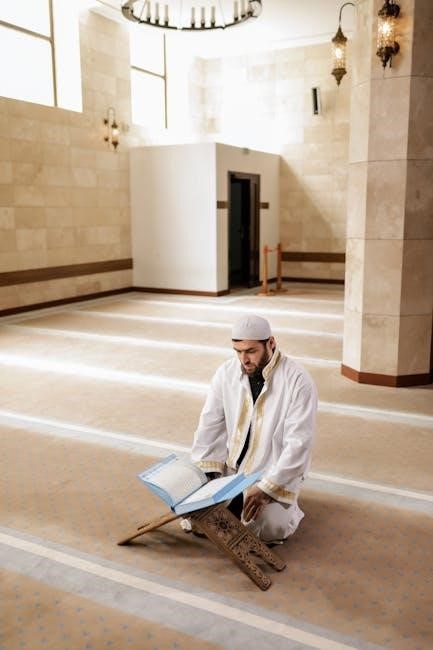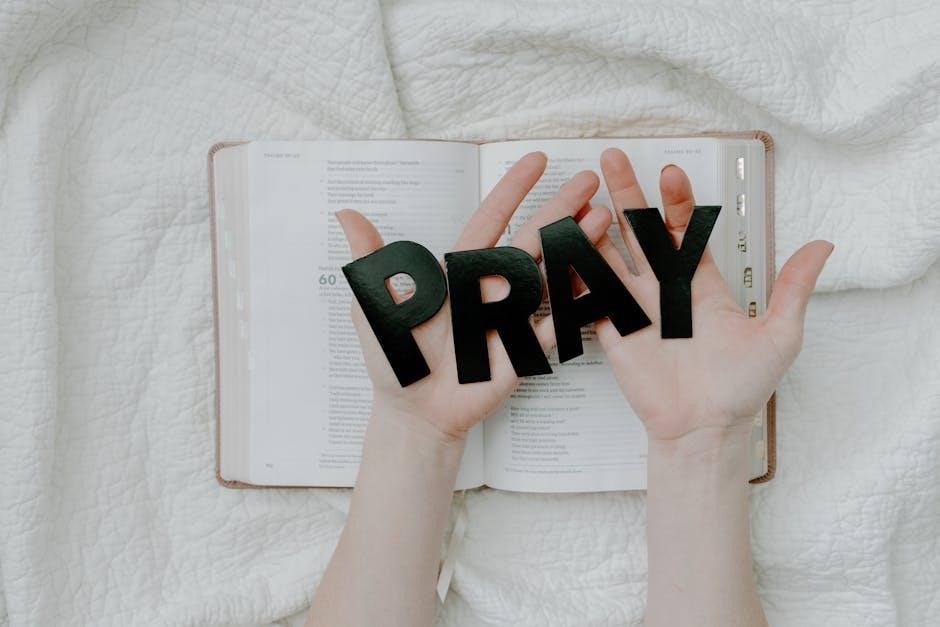Prince Hall Freemasonry, founded by Prince Hall in 1775, is a historically Black Masonic tradition emphasizing brotherhood, moral values, and community service. Its rituals, preserved in the Prince Hall Masonic Ritual Book, guide members through symbolic degrees, fostering spiritual growth and unity.
Who Was Prince Hall?
Prince Hall, a former slave, became a prominent African American leader and abolitionist in the late 18th century. He founded Prince Hall Freemasonry in 1775, creating a legacy of brotherhood and community service. Hall advocated for education and social justice, leaving a lasting impact on African American history. His teachings and principles are preserved in the Prince Hall Masonic Ritual Book, guiding members in their moral and spiritual journey.
The Founding of Prince Hall Freemasonry
Prince Hall Freemasonry was established in 1775 when Prince Hall, a freed slave, and 14 African American men were initiated into Freemasonry by a British military lodge. They formed African Lodge No. 1, which later became the cornerstone of Prince Hall Freemasonry. Due to racial segregation, the lodge sought and received a charter from the Grand Lodge of England in 1784, formalizing the tradition. The Prince Hall Masonic Ritual Book has since been central to preserving the order’s teachings and practices.
The Significance of the Prince Hall Tradition
Prince Hall Freemasonry holds profound cultural and historical significance, serving as a cornerstone for African American fraternal life. Established during a time of racial exclusion, it provided a space for Black men to unite, share knowledge, and advocate for equality. The tradition emphasizes brotherhood, moral development, and community service, with its rituals and teachings preserved in the Prince Hall Masonic Ritual Book. This legacy continues to inspire members, fostering a sense of identity and pride while promoting unity and progress.
History of the Prince Hall Masonic Ritual Book
The Prince Hall Masonic Ritual Book originated from Prince Hall’s teachings, serving as a guide for moral and spiritual growth within the tradition. It is used by the Most Worshipful Prince Hall Grand Lodge and remains a vital resource, now widely available in PDF format for members.
Development of the Ritual Book
The Prince Hall Masonic Ritual Book was developed from the teachings of Prince Hall, blending traditional Freemasonry with African-American cultural and spiritual influences. It was originally handwritten and later published by the Masonic Supply Company in New York, ensuring its widespread use among lodges. The book underwent revisions to maintain relevance while preserving core principles, making it a cornerstone of Prince Hall Freemasonry’s practices and traditions.
Evolution Over Time
The Prince Hall Masonic Ritual Book has evolved to reflect contemporary needs while preserving its historical essence. Initially published by the Masonic Supply Company, it has undergone revisions to align with modern practices. Digital versions, such as the flipbook by tannerdarrell in 2022, have enhanced accessibility. Despite these updates, the core teachings and symbolism remain intact, ensuring continuity and relevance for new generations of Prince Hall Freemasons.
Publication and Distribution
The Prince Hall Masonic Ritual Book is published by the Masonic Supply Company and distributed through Grand Lodges. It’s available in print and digital formats, including PDF versions on platforms like Scribd. The book is accessible to verified members, ensuring confidentiality. Its widespread distribution ensures that Prince Hall Freemasons globally can access the rituals, maintaining unity and adherence to tradition.
Structure of the Prince Hall Masonic Ritual Book
The Prince Hall Masonic Ritual Book is organized into key sections, including ceremonies and degree work, providing a structured guide for members to follow and understand.
Organization of the Ritual
The Prince Hall Masonic Ritual Book is meticulously organized, with ceremonies divided into degrees, each containing specific instructions and symbolic content. The book begins with opening and closing ceremonies, followed by degree work, including the Entered Apprentice, Fellowcraft, and Master Mason degrees. Additional sections cover funerals, installations, and fraternal greetings. The ritual is structured to ensure clarity and consistency, guiding members through progressive lessons. Electronic versions, such as PDFs, maintain this organization while enhancing accessibility for modern members.
Key Sections and Ceremonies
The Prince Hall Masonic Ritual Book contains essential sections such as the Entered Apprentice, Fellowcraft, and Master Mason degrees, each rich in symbolic teachings. Ceremonies include openings, closings, and degree conferrals, with detailed instructions for officers. Funeral rites and fraternal greetings are also included, emphasizing brotherly love and respect. These sections are designed to guide members through moral and ethical lessons, fostering personal growth and unity within the fraternity. The structure ensures a cohesive progression of Masonic principles and values.
Initiation and Degree Work
The Prince Hall Masonic Ritual Book outlines the initiation process and degree work, guiding members through symbolic ceremonies. The Entered Apprentice degree introduces candidates to Masonic principles, while Fellowcraft and Master Mason degrees build on moral and ethical teachings. Each degree incorporates rituals, lectures, and historical references, ensuring a comprehensive understanding of the fraternity’s values. The initiation process is transformative, emphasizing personal growth, brotherhood, and service to humanity. The rituals are conducted with precision to preserve tradition and uphold the legacy of Prince Hall Freemasonry.
Masonic Secrecy and the Ritual Book
Masonic secrecy safeguards the sacred rituals and symbols within the Prince Hall Ritual Book, ensuring confidentiality and reverence among members while preserving tradition and upholding the legacy.
Importance of Secrecy in Freemasonry
Masonic secrecy is not about concealment but about protecting sacred traditions and rituals from misuse. It fosters trust and accountability among members, ensuring the integrity of the craft. Secrecy safeguards the symbolic teachings and prevents external misinterpretation, preserving the Prince Hall Ritual Book’s profound meanings. This confidentiality strengthens fraternal bonds and maintains the legacy of the tradition, ensuring rituals remain meaningful and revered within the brotherhood.
Protection of Ritual Content
The Prince Hall Masonic Ritual Book’s content is zealously protected to preserve its sanctity and prevent unauthorized access. Members swore oaths to uphold confidentiality, ensuring rituals remain exclusive to initiated brethren. Digital versions, like PDFs, are secured with encryption and restricted distribution, safeguarding against leaks. This vigilant protection maintains the rituals’ integrity, ensuring they are only experienced within the lodge, where their true significance can be appreciated and respected by those who have earned the right to partake.
Consequences of Unauthorized Disclosure
Unauthorized disclosure of the Prince Hall Masonic Ritual Book’s content is considered a severe breach of trust. Members found guilty face penalties, including expulsion from the fraternity and revocation of membership privileges; Legal action may also be taken to protect intellectual and cultural property. Such violations not only undermine the ritual’s sanctity but also damage the brotherhood’s integrity, emphasizing the importance of adhering to confidentiality and upholding the tradition’s cherished values.

Symbolism in the Prince Hall Ritual
The Prince Hall Ritual is rich in symbolic imagery, such as the All-Seeing Eye, square, and compasses, representing divine watchfulness, moral integrity, and the pursuit of truth.
Core Symbols and Their Meanings
The Prince Hall Ritual emphasizes the All-Seeing Eye, symbolizing divine watchfulness, and the square and compasses, representing moral integrity and self-control. These symbols guide members to balance faith, reason, and conduct. The level teaches equality, the plumb rule righteousness, and the trowel unity. Together, these icons embody the fraternity’s principles, fostering personal growth and brotherly love while reinforcing ethical living and spiritual reflection.
Ritualistic Use of Symbols
In Prince Hall rituals, symbols like the All-Seeing Eye, square and compasses, level, plumb, and trowel are integral to ceremonies. These symbols are displayed in lodges and incorporated into degree work to teach moral lessons. The square and compasses remind members to circumscribe their passions, while the level and plumb symbolize equality and uprightness. Ritualistic use of these symbols reinforces their significance, guiding members through initiation and advanced degrees while emphasizing fraternity values and spiritual growth.
Symbolism in Lodge Ceremonies
Prince Hall lodge ceremonies are rich in symbolic expressions, using tools like the square, compasses, level, and plumb to convey moral truths. These symbols are displayed prominently, guiding members through initiation and degree work. The All-Seeing Eye represents divine oversight, while the trowel symbolizes spreading brotherly love. Ceremonies incorporate these symbols to teach lessons on equality, justice, and virtue, reinforcing the Masonic principles of unity and moral development among members.
Differences from Mainstream Masonic Rituals
Prince Hall rituals emphasize moral truths and ethical conduct, with unique symbolic tools and ceremonies reflecting its historical roots and distinct cultural perspective within Freemasonry.
Comparative Analysis with Other Traditions
Prince Hall Masonic rituals share similarities with mainstream Freemasonry, such as the three degrees of initiation, but distinct differences exist in their cultural and historical emphasis. The Prince Hall tradition often incorporates unique symbolic tools and ceremonies, reflecting its African American heritage and focus on moral truths. While mainstream rituals may vary by jurisdiction, Prince Hall rituals are known for their strong emphasis on community service and ethical conduct, setting them apart while maintaining core Masonic principles.
Unique Aspects of Prince Hall Rituals
The Prince Hall Masonic rituals are distinguished by their deep-rooted connection to African American history and culture. They emphasize the struggles and triumphs of Black communities, integrating unique symbolic tools and ceremonies that reflect this heritage. Unlike mainstream traditions, Prince Hall rituals often incorporate specific historical references and moral teachings tailored to the experiences of its members, fostering a strong sense of identity and purpose. This cultural infusion makes the rituals uniquely meaningful within the broader Masonic framework.
Historical Context of Differences
The differences in Prince Hall rituals stem from their origins in the 18th century, when Prince Hall founded the tradition for African Americans excluded from mainstream Freemasonry. The rituals reflect a blend of African cultural influences and European Masonic traditions, shaped by the unique historical experiences of Black communities. This separation led to distinct symbolic practices and moral teachings, emphasizing liberation, equality, and resilience, which are central to the Prince Hall tradition’s identity and practices today.
Accessing the Prince Hall Ritual Book
The Prince Hall Masonic Ritual Book is accessible in PDF format, published by the Masonic Supply Company and distributed through Grand Lodges for authenticated members.
Obtaining the Ritual Book
The Prince Hall Masonic Ritual Book can be obtained through the Most Worshipful Prince Hall Grand Lodge or authorized Masonic suppliers. It is published in PDF format by the Masonic Supply Company and distributed to verified members. The book is also available digitally, with versions accessible via platforms like Scribd as flipbooks. Authentication by Grand Lodge officials ensures the ritual’s integrity and adherence to tradition. Members must follow proper protocols to acquire and handle the material responsibly.
Role of the Grand Lodge
The Most Worshipful Prince Hall Grand Lodge oversees the publication and distribution of the Prince Hall Masonic Ritual Book. It ensures the ritual’s authenticity and consistency across lodges. The Grand Lodge verifies membership before granting access to the book, maintaining confidentiality and upholding Masonic traditions. It also provides guidance on the proper use of the ritual, ensuring its integrity and relevance for modern members while preserving its historical significance.
Digital Availability and PDF Formats
The Prince Hall Masonic Ritual Book is available in secure PDF formats, accessible through authorized channels. Online platforms like Scribd offer digital versions, while Grand Lodges provide encrypted files to verified members. This ensures the ritual’s confidentiality while accommodating modern accessibility needs, allowing Brothers to engage with the text conveniently without compromising Masonic secrecy. Digital formats enhance preservation and portability, maintaining the tradition’s integrity in the digital age.

Modern Relevance of the Ritual Book
The Prince Hall Ritual Book remains vital today, inspiring modern Masons with timeless principles, fostering personal growth, and strengthening fraternal bonds in contemporary times.
Contemporary Use in Lodges
The Prince Hall Ritual Book is actively used in modern lodges to guide ceremonies, degree work, and fraternal education. Its teachings reinforce moral values and unity among members. Lodges adapt rituals to resonate with today’s challenges while preserving tradition. Digital versions, such as PDFs, enhance accessibility for younger members, ensuring the legacy endures. The book remains central to lodge activities, fostering personal growth and communal bonds, blending history with modern relevance.
Adaptations for Modern Members
The Prince Hall Masonic Ritual Book has been adapted to meet the needs of modern members while preserving its historical significance. Digital versions, such as PDFs, are now widely used, making the rituals more accessible. Lodges incorporate modern tools and technology to enhance understanding and engagement. These adaptations ensure the teachings remain relevant, appealing to younger generations while maintaining the tradition’s core values and symbolism.
Role in Masonic Education
The Prince Hall Masonic Ritual Book serves as a central educational resource for members, providing detailed instructions for rituals and ceremonies. It ensures consistency in teachings across lodges, fostering a unified understanding of Masonic principles. The book also offers historical context, enriching members’ appreciation of the tradition. By studying the ritual, members gain deeper insights into ethical conduct, leadership, and community service, aligning with the fraternity’s mission to enlighten and uplift.

Security Measures for the Ritual Book
The Prince Hall Masonic Ritual Book is protected through encrypted PDFs, secure storage, and limited access to authorized members only, ensuring confidentiality.
Protocols for Handling Ritual Materials
Protocols for handling the Prince Hall Masonic Ritual Book include secure storage in encrypted PDF formats, limited access to authorized members, and strict procedures during lodge meetings. Members must ensure the ritual book is not shared or discussed outside approved settings. Physical copies are stored in locked repositories, and digital versions require multi-factor authentication. Breaches of these protocols result in disciplinary action, emphasizing the importance of maintaining confidentiality and upholding Masonic traditions.
Electronic Security of PDF Versions
The Prince Hall Masonic Ritual Book in PDF format is safeguarded using advanced encryption and password protection to prevent unauthorized access. Access is restricted to verified members with secure login credentials. Regular audits and monitoring ensure compliance with security protocols. Digital rights management tools prevent copying or sharing, maintaining the integrity of the ritual content. These measures uphold the tradition of Masonic secrecy while adapting to modern technological challenges.
Conducting Lodge Meetings Securely
Lodge meetings are conducted with utmost confidentiality, ensuring only authorized members attend. Secure locations are chosen, and access is verified through rituals and credentials. Electronic devices are prohibited during sessions to prevent recording or leaks. Members are reminded of their oath of secrecy, reinforcing the importance of discretion. The ritual book is handled with care, stored securely, and only accessed during formal proceedings. These practices maintain the integrity and sacred nature of Prince Hall Freemasonry traditions.

Impact of the Ritual Book on Members
The Prince Hall Masonic Ritual Book profoundly impacts members by fostering personal growth, strengthening fraternal bonds, and deepening spiritual reflection, enriching their lives and communities.
Personal Development Through Ritual
The Prince Hall Masonic Ritual Book serves as a powerful tool for personal development, guiding members through symbolic journeys that foster self-reflection, moral growth, and self-awareness. By participating in structured ceremonies, members cultivate ethical standards, emotional resilience, and a deeper understanding of their role in society. The rituals encourage introspection, helping individuals align their actions with Masonic principles, thereby promoting a balanced and virtuous life. This transformative process strengthens character, empowering members to contribute meaningfully to their communities and uphold the fraternity’s legacy.
Community Building in Lodges
The Prince Hall Masonic Ritual Book fosters community building by uniting members through shared rituals and ceremonies. These structured practices encourage collaboration, mutual respect, and a collective commitment to Masonic values. Lodges become spaces for bonding, as members work together to uphold traditions and support one another. The ritual book serves as a unifying guide, ensuring harmony and shared purpose among brethren, thereby strengthening the lodge’s role as a vibrant, interconnected community dedicated to fellowship and service.
Spiritual Growth and Reflection
The Prince Hall Masonic Ritual Book serves as a catalyst for spiritual growth and reflection, offering members a pathway to introspection and enlightenment. Through its symbolic teachings and ceremonies, the ritual book encourages brethren to explore deeper meanings of life, morality, and their connection to the divine. Members are prompted to reflect on their actions and aspirations, fostering a sense of purpose and spiritual fulfillment. This introspective journey, guided by the ritual book, strengthens their commitment to Masonic principles and personal development.
Misconceptions About the Ritual Book
A common misconception is that the Prince Hall Masonic Ritual Book is entirely secret or inaccessible. While its content is protected, PDF versions are available to authorized members, ensuring preservation of traditions while maintaining confidentiality.
Common Myths and Misunderstandings
A common myth is that the Prince Hall Masonic Ritual Book is entirely secret or encoded, but it is accessible to authorized members. Some believe it contains hidden codes or restricted knowledge, while others think it is inaccessible to the public. However, the book is available in PDF formats for members, dispelling notions of absolute secrecy. Misunderstandings also arise about its content, with speculation often exceeding reality. The book’s purpose is spiritual growth, not concealment, emphasizing moral and ethical development.
Clarifying the Purpose of the Ritual
The Prince Hall Masonic Ritual Book serves as a guide for members, outlining ceremonies and principles that promote moral and ethical development. Its purpose is to educate members on the fraternity’s values, such as brotherly love, relief, and truth. The rituals are designed to inspire reflection and unity, fostering personal growth and communal bonds. They are not merely symbolic but provide a structured path for understanding Freemasonry’s teachings and applying them in daily life.
Dispelling Myths About Secrecy
Many misconceptions surround Prince Hall Freemasonry’s secrecy. While rituals are private, they are not sinister or hidden from the public out of malice. The Prince Hall Masonic Ritual Book is available in PDF formats, disproving claims of absolute secrecy. Secrecy primarily protects the deeper meanings and symbolic teachings, ensuring they are understood within the proper context. It is not about hiding information but preserving the integrity and significance of the tradition for its members.
The Prince Hall Masonic Ritual Book PDF serves as a vital guide, preserving traditions and fostering Masonic education, unity, and spiritual growth among its members.
The Prince Hall Masonic Ritual Book PDF is a cornerstone of African American Freemasonry, detailing rituals and traditions. It emphasizes moral development, unity, and service. Available digitally, it ensures accessibility while maintaining secrecy. The Grand Lodge oversees its distribution, safeguarding its integrity. The text reflects historical legacy and contemporary relevance, inspiring personal and communal growth among members. Its symbolism and teachings remain central to Prince Hall Freemasonry’s enduring impact.
Final Thoughts on the Ritual Book’s Significance
The Prince Hall Masonic Ritual Book PDF holds profound significance as a preserved legacy of African American Freemasonry. It encapsulates timeless values, fostering unity and moral growth. Its digital availability ensures modern accessibility while maintaining sacred traditions. As a guide for spiritual and communal development, it remains vital to Prince Hall Freemasonry, honoring its founder’s vision and continuing to inspire future generations through its enduring teachings and symbolic richness.
